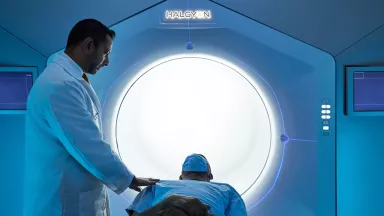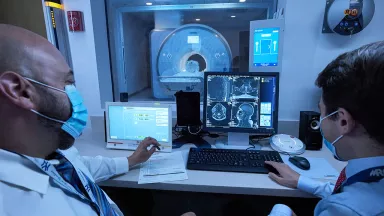At Montefiore Einstein Comprehensive Cancer Center, our patients have access to some of the most advanced minimally invasive surgical techniques to help manage and treat cancer.
Our multidisciplinary team includes world leaders in the development and administration of minimally invasive surgical approaches.
Partnering to Advance Robotic and Minimally Invasive Surgery
The team at Montefiore Einstein Comprehensive Cancer Center partners with the Montefiore Institute for Minimally Invasive Surgery (MIMIS) to bring the latest tools and technologies to your care.
As a premier research and training facility, the institute investigates the best and latest uses of minimally invasive surgery technologies. It also serves as a testing and evaluation site, providing access to new technologies not yet widely available.
About Robotic & Minimally Invasive Surgery
Minimally invasive surgery involves creating several small incisions or cuts to access the surgical site. This is different from traditional open surgery, which involves making larger incisions and cuts along your body. Many of our minimally invasive surgeries are done using the latest robotic technology.
We use robotic and minimally invasive surgery to manage and treat many types of cancer, including colon cancer, esophageal and gastric cancer and small bowel cancers.
Our surgeons also use minimally invasive methods when performing radiosurgery and regional therapy for cancer treatment.
Robotic and Minimally Invasive Surgery: What to Expect
Compared to traditional open surgery, robotic and minimally invasive surgery offers benefits such as:
- Less blood loss
- Less chance of a hernia developing after the operation
- Less chance of needing a blood transfusion
- Less pain
- Less risk of complications and infection
- Less scarring
- Quicker recovery with less downtime
- Shorter hospital stay
- Smaller incisions
Robotic and Minimally Invasive Surgery to Treat Colon Cancer
At Montefiore Einstein Comprehensive Cancer Center, we offer laparoscopic and robotic surgeries that save the sphincter, which greatly reduces the likelihood of needing a colostomy.
Robotic and Minimally Invasive Surgery to Treat Esophageal and Gastric Cancer
Our surgical oncology team offers minimally invasive and robotic options for many types of surgeries for esophageal and gastric cancers. We can talk to you about having video-assisted thoracoscopic surgery (VATS), for example, or an endoluminal procedure in which we remove tumors using a long, lighted flexible tube that’s less likely to damage nearby healthy organs.
Robotic & Minimally Invasive Surgery to Treat Pancreatic and Liver Cancer
While operations for these types of cancer are usually complex and involve large cuts or incisions to the body, our surgical oncology team can often remove tumors in the liver or pancreas using a minimally invasive, robotic approach that allows for a faster recovery and less pain.
Robotic and Minimally Invasive Surgery to Treat Gynecologic Cancers
At Montefiore Einstein Comprehensive Cancer Center, you have access to the latest options in robotic and minimally invasive surgery for gynecologic cancers to minimize your pain and speed your recovery.
Robotic and Minimally Invasive Surgery to Treat Head and Neck Cancer
Montefiore Einstein Comprehensive Cancer Center is one of only a few centers in the New York Metropolitan Area that can perform surgery for advanced-stage laryngeal cancer using minimally invasive endoscopic techniques that help preserve the voice and ability to swallow.
Robotic and Minimally Invasive Surgery to Treat Prostate Cancer
Our comprehensive cancer center offers state-of-the-art robotic surgery to treat prostate cancer. This means that after surgery, patients can often get all the advantages of a minimally invasive procedure, such as preserving erectile function and urinary continence.
Robotic and Minimally Invasive Surgery to Treat Melanoma
Montefiore Einstein Comprehensive Cancer Center offers isolated limb infusion (ILI) to treat melanoma. This type of infusion is a minimally invasive procedure.
Robotic and Minimally Invasive Surgery to Treat Lung Cancer and Mediastinal Tumors
We often use robotic surgery to treat mediastinal tumors located in the middle chest, between the breastbone and spinal column, as well as to perform thymectomy (removal of the thymus gland). This minimally invasive approach can help patients return to their usual daily activities more quickly than traditional open surgeries because there’s less trauma to the body.
Robotic and Minimally Invasive Surgery to Treat Sarcoma
Montefiore Einstein Comprehensive Cancer Center surgeons may use navigation-guided surgery, also called image-guided or computer-assisted surgery, to treat sarcoma. Imaging tools such as computed tomography (CT) scans are often used to help position and move surgical instruments in real time, enabling the surgeon to make very small and specific adjustments.
Robotic and Minimally Invasive Surgery to Treat Urologic Cancers
For the treatment of urologic cancers, minimally invasive and robotic surgery provides the extreme precision required for complex procedures in delicate areas of the urinary tract. Surgeons use these tools when performing procedures such as urinary diversion, partial nephrectomy and radical cystectomy.

Cancer Clinical Trials
- Blood & Bone Marrow Cancers
- Brain, Spine & Central Nervous System Cancers
- Breast Cancer
- Childhood Cancers
- Endocrine System Cancers
- Gastrointestinal (GI) Cancers
- Genitourinary (GU) & Urologic Cancers
- Gynecologic Cancers
- Head & Neck Cancers
- Kaposi Sarcoma & AIDS-Related Cancers
- Lung & Chest Cancers
- Prostate Cancer
- Sarcomas
- Skin Cancer








